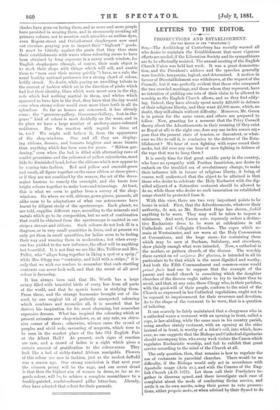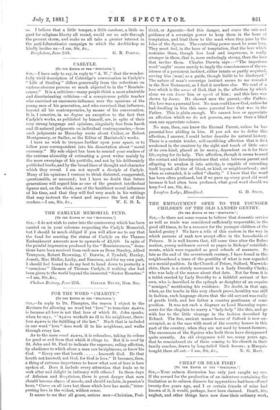LETTERS TO THE EDITOR.
PROSECUTIONS AND ESTABLISHMENT.
(TO THE EDITOR OF THE " SPECTATOR.")
SIR,—The Archbishop of Canterbury has recently warned all who desire to maintain the Establishment that more vigorous efforts are needed, if the Liberation Society and its sympathisers are to be effectually resisted. The annual meeting of the English Church Union was held last week. It was a great demonstra- tion, and the President's address and the speeches generally were forcible, temperate, logical, and determined. A motion in favour of Disestablishment was withdrawn, at the request of the Council; but it was perfectly evident that those who composed the two crowded meetings, and those whom they represent, have no intention of yielding one iota of their claim to be allowed to worship as the English Church allows, and as they find edify- ing. Indeed, they have already spent nearly £20,000 in defence of their religious liberty, and they want £2,000 more, which, no doubt, they will obtain without difficulty. Moreover, Mr. Green is in prison for the same cause, and others are prepared to follow. Now, granting for a moment that the Privy Council theory about the Advertisements in their meaning (if they exist as Royal at all) is the right one, does any one in-his senses sap. pose that the present state of tension, or discontent, or what- ever we like to call it, is conducive to the defence of the Esta- blishment? We hear of men fighting with ropes round their necks, but did ever any one hear of men fighting in defence of the rope that was to hang them ?
It is surely time for that great middle party in the country, who have no sympathy with Puritan fanaticism, nor desire to embark on the troubled sea of revolutionary change, to make their influence felt in favour of religious liberty, it being, of course, well understood that the object to be attained is that those who desire to celebrate the Holy Eucharist with the dig- nified adjunct of a distinctive vestment should be allowed to do so, while those who desire no such innovation on established usage should be protected from it.
With this view, there are two very important points to be borne in mind. First, that the Advertisements, whatever their authority, do not, as Mr. Beresford Hope has shown, forbid anything to be worn. They may well be taken to impose a minimum. And next, Canon xxiv. expressly orders a distinc- tive Eucharistic dress to be worn at celebrations in all Cathedrals and Collegiate Churches. The copes which re- main at Westminster, and are worn at the Holy Communion at Coronations, and the huge cases. for containing them which may be seen at Durham, Salisbury, and elsewhere, show plainly enough what were intended. Now, a cathedral is the mother, or pattern church, of the diocese. The worship there carried on ad 1najorem Del gloriam, is intended in all its particulars to be that which is the most dignified and worthy. And both the Fifth Commandment and common-sense would primd facie lead one to suppose that the example of the parent and model church is something which the daughter churches of the diocese ought rather to try to imitate than to avoid, and that, at any rate, those Clergy who, in their parishes, with the good-will of their people, conform to the mind of the Church as expressed in her Cathedral regulations, ought not to be exposed to imprisonment for their reverence and devotion. As to the shape of the vestment to be worn, that is a question of tailoring.
It can scarcely be fairly maintained that a clergyman who in a cathedral wears a vestment with an opening in front, called a cope, is law-abiding, while the same man in his country parish, using another stately vestment, with an opening at the sides instead of in front, is worthy of a felon's cell, into which, how- ever, no one suggests that the Bishops and Cathedral dignitaries should accompany him, who every week violate the Canon which regulates Eucharistic worship, and fail to exhibit that great service according to the mind of the Church at all.
The only question, then, that remains is how to regulate the use of vestments in parochial churches. There would• be no difficulty, if the Bishops would only act in accordance with Apostolic usage (Acts xv.), and with the Canons of the Eng- lish Church (A.D. 1071). Let them call their Presbyters to- gether in diocesan synod, and there investigate each case of complaint about the mode of conducting divine service, and settle it on its own merits, using their power to veto prosecu- tions, either proprio mote, or when advised by their Synod to do .so. I believe that a little temper, a little candour, a little re- gard for religious liberty all round, would see us safe through the present storm, and make us all take a greater interest in the anti-Liberationist campaign to which the Archbishop so kindlyinvites us.-1 am, Sir, &c.,
Barghclere, June 26th. G. R. PORTAL.



































 Previous page
Previous page